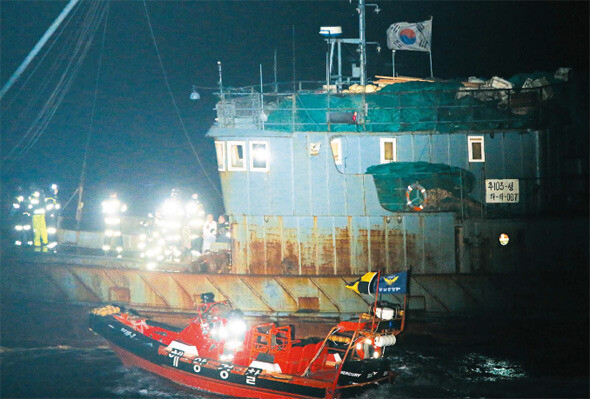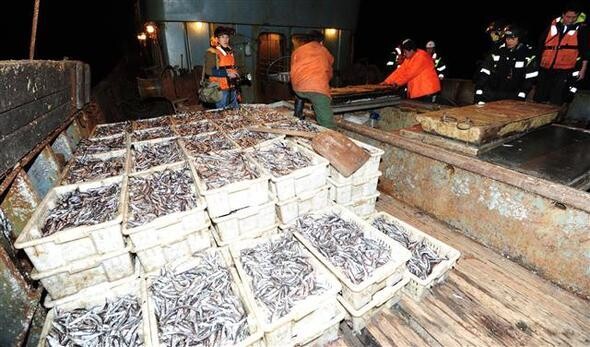hankyoreh
Links to other country sites 다른 나라 사이트 링크
The bloody fight against illegal fishing by Chinese boats

By Park Im-keun, North Jeolla correspondent
It was early on Oct. 16 in the West (Yellow) Sea Exclusive Economic Zone, about 45 miles (83 km) northwest of Hong Island in South Jeolla Province’s Sinan County. Powerful winds whipped the waves to heights of over three meters. A half moon hung bleakly in the early evening sky overhead. In waters too darkened to afford a clear view ahead, hundreds of Chinese fishing boats had crossed over to illegally ply the waters. Chinese fishing boats have devastated populations of croaker, squid, and even small fish in South Korean waters.
Inside Patrol Ship 3010, a 3,000-ton vessel sent by the West Sea Regional Headquarters of Korea Coast Guard to crack down on the Chinese boats, the wheelhouse was buzzing with tension. At about 6:30 pm, two high-speed boats left it at the same time carrying inspection personnel. Each boat held nine agents, eighteen in all.
Back inside the wheelhouse, wireless communications with the high-speed boats began to pick up.
“Stay close to each other. It’s dark, so be careful about slipping. Safety first.”

Song Il-jong, chief of the Gunsan Coast Guard, stressed the importance of safety, and of checking to see that batteries and other recording equipment were in good order. His orders have taken on greater urgency since a Chinese captain was fatally shot on Oct. 10 during a Coast Guard crackdown on illegal fishing.
From Apr. 16 to Oct. 15, a six-month ban is placed on fishing to protect marine resources. This was its last day in effect for the year.
“Chinese boats went to wait at the borders of the EEZ right before the ban was lifted in order to do mass fishing,” explained Superintendent Kim Guk-seong, captain of the 3010. “Then, when evening fell, they moved in, taking advantage of the bigger waves.”
The West Sea Coast Guard estimated that around 1,500 Chinese trawlers would begin coming into the South Korean EEZ on Oct. 15 to fish.
To get an early start on its illegal fishing crackdown, the Coast Guard is staging a special control period from Oct. 15 to 17 with 24 vessels, including 17 of its patrol ships. But there is only so much it can do with the veritable swarm of Chinese boats. No sooner is one group chased out than another arrives to take its place. Crew members on the Chinese boats put up a fierce resistance, brandishing dangerous weapons at the Coast Guard inspectors.
“We’ve had Chinese crew members throw kitchen knives, fire extinguishers, and gas barrels at us when they’re caught,” said policeman Park Se-cheol, 32, who is part of the inspection team.
“Our high speed boats are small, without anywhere to escape, so you sometimes feel like your life is really in danger,” he added.
Sergeant Lee Nam-gok, 42, heads up the inspection team for the high-speed boats.
“Chinese sailors fire lasers that can leave you permanently blinded, and we’ve had inspectors fall off the boat into the ocean when the waves are high,” he said. “Recently, the Chinese boats have been plating their decks with metal and attaching iron bars.”
Indeed, one of the high-speed boats did overturn while inspectors were attempting to board a Chinese boat on Oct. 15. In a frightening episode, the vessel was flipped by the iron bars when the Chinese boat suddenly changed direction. Seven inspectors ended up in the ocean; all were safely rescued by the other high-speed boat. The Chinese boat escaped in the chaos.
The reason the Chinese boats put up such a fight is because their owner is liable for a “security fee” - effectively a fine - if they are caught, and the captain ends up having his pay docked for the difference, the Coast Guard explained. Security fees typically run between 100 million to 150 million won (US$94,200-141,300).
“We captured four Chinese boats for illegal fishing between the evening of Oct. 15 and the morning of Oct. 16. Fortunately, none of our agents were injured,” said Kim Guk-seong.
“Morale is sagging a bit after the decision to disband the Coast Guard, but our agency is still working to protect the seas,” he added.
[%%IMAGE3%%]Please direct questions or comments to [english@hani.co.kr]

Editorial・opinion
![[Column] Season 2 of special prosecutor probe may be coming to Korea soon [Column] Season 2 of special prosecutor probe may be coming to Korea soon](https://flexible.img.hani.co.kr/flexible/normal/500/300/imgdb/original/2024/0426/3317141030699447.jpg) [Column] Season 2 of special prosecutor probe may be coming to Korea soon
[Column] Season 2 of special prosecutor probe may be coming to Korea soon![[Column] Park Geun-hye déjà vu in Yoon Suk-yeol [Column] Park Geun-hye déjà vu in Yoon Suk-yeol](https://flexible.img.hani.co.kr/flexible/normal/500/300/imgdb/original/2024/0424/651713945113788.jpg) [Column] Park Geun-hye déjà vu in Yoon Suk-yeol
[Column] Park Geun-hye déjà vu in Yoon Suk-yeol- [Editorial] New weight of N. Korea’s nuclear threats makes dialogue all the more urgent
- [Guest essay] The real reason Korea’s new right wants to dub Rhee a founding father
- [Column] ‘Choson’: Is it time we start referring to N. Korea in its own terms?
- [Editorial] Japan’s rewriting of history with Korea has gone too far
- [Column] The president’s questionable capacity for dialogue
- [Column] Are chaebol firms just pizza pies for families to divvy up as they please?
- [Column] Has Korea, too, crossed the Rubicon on China?
- [Correspondent’s column] In Japan’s alliance with US, echoes of its past alliances with UK
Most viewed articles
- 1[Column] Season 2 of special prosecutor probe may be coming to Korea soon
- 2‘We must say no’: Seoul defense chief on Korean, USFK involvement in hypothetical Taiwan crisis
- 3Is N. Korea threatening to test nukes in response to possible new US-led sanctions body?
- 4Division commander ordered troops to enter raging flood waters before Marine died, survivor says
- 5Is Japan about to snatch control of Line messenger from Korea’s Naver?
- 6No good, very bad game for Korea puts it out of Olympics for first time since 1988
- 7[Editorial] Korea’s surprise Q1 growth requires objective assessment, not blind fanfare
- 8Korea’s 1.3% growth in Q1 signals ‘textbook’ return to growth, says government
- 9N. Korean delegation’s trip to Iran shows how Pyongyang is leveraging ties with Moscow
- 10Amnesty notes ‘erosion’ of freedom of expression in Korea in annual human rights report